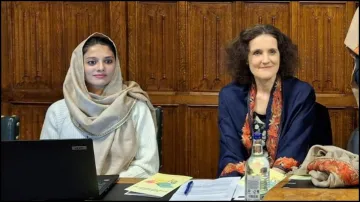London: Kashmiri activist and journalist Yana Mir strongly denounced Pakistan's propaganda to "dent India's image on the international stage" on the issue of Jammu and Kashmir and asserted that she was completely safe and free in "Kashmir, which is a part of India." She also drew parallels with Nobel laureate Malala Yousafzai, who was shot in Pakistan for advocating women's rights.
At the 'Sankalp Divas' hosted by the UK Parliament in London, Mir urged the international media community to "stop dividing" the people of Jammu and Kashmir. The activist said she "is not Malala Yusufzai," who had to flee Pakistan because of severe threats of terrorism, as India will always remain united against such forces.
"I am not a Malala Yousufzai, because I am free and safe in my country, India. In my homeland, Kashmir, which is part of India. I will never need to run and seek refuge in your country. I will never be a Malala Yusufzai but I object to Malala for defaming my country, my progressive homeland, by calling it oppressed," Mir said at the UK Parliament.
Stop trying to polarise Indian society: Yana Mir
She also strongly opposed "toolkit members" who never visited Indian Kashmir but fabricated stories of oppression from there. "I urge you to stop polarising Indians on the grounds of religion. We won't allow you to break us. This year on Sankalp Divas, all I hope for is that our perpetrators living in the UK and Pakistan will stop maligning my country in international media or on international human rights forums," Mir added.
She also appealed to the media to stop unwanted selective outrage and attempts to polarise Indian society by reporting from their "UK rooms", adding that thousands of Kashmiri mothers have already lost their sons to terrorism. Mir received the Diversity Ambassador Award for championing diversity in Jammu and Kashmir.
The Kashmir journalist also outlined the progress following the abolition of Article 370 in the sectors of improved security, government initiatives, and fund allocation. She praised the Indian Army's efforts, including de-radicalisation programmes and substantial investments in youth for sports and education.
Human rights abuses in Pakistan-occupied Kashmir
The event in London marked the unanimous resolution passed by both Houses of the Indian Parliament on February 22, 1994, reaffirming India's unwavering stance that the entire region of Jammu and Kashmir is an integral part of India and reaffirming India's right to reclaim Mirpur-Muzaffarabad and Gilgit and Baltistan, currently occupied by Pakistan.
Attended by over 100 attendees, the gathering included members of the UK Parliament, local councillors, community leaders, representatives from various organizations, and prominent members of the diaspora. The keynote speakers were Professor Sajjad Raja from Pakistan Occupied Kashmir (PoK) who is currently residing in exile in the United Kingdom and Mir herself.
Sajjad Raja underscored the egregious violation of basic human rights in PoK. He urged individuals to voice their concerns and stand against Pakistan's illegal occupation of PoK. Earlier, the exiled chairman of the United Kashmir People's National Party (UKPNP) Sardar Shaukat Ali Kashmiri in Switzerland expressed disappointment over Pakistan's inability to give justice and basic human rights to the people of POK and Gilgit-Baltistan.
Recent reports suggested that there was a rise in the number of telecommunication towers along the Line of Control in Pakistan-occupied Kashmir (PoK), allegedly with the intention of assisting terrorists and their associates in carrying out infiltration activities. The deliberate placement of telecom towers near the LoC and the international border, primarily intended to assist terrorists and their accomplices in infiltration activities, constitutes a violation of Article 45 of the International Telecommunication Union (ITU) constitution.
(with inputs from ANI)
ALSO READ | Pakistan increases telecom towers in PoK to help terror groups to carry out infiltration activities: Officials
Latest World News
